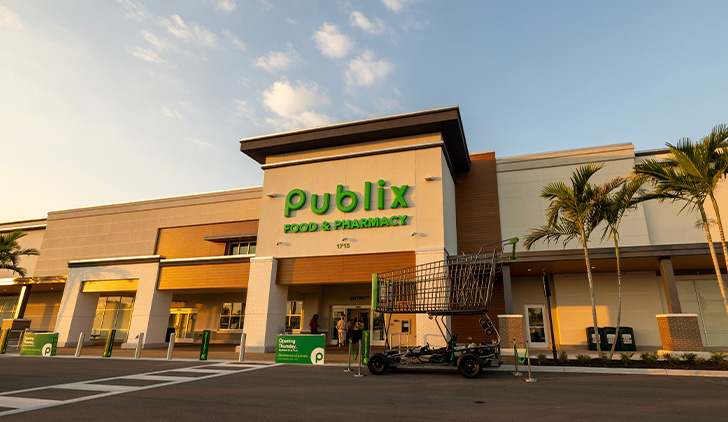
With five different generations being part of our workforce, we embrace these multi-generational teams working together to build the future of our company. Publix values every associate and wants every generation to grow and succeed together.
So why is it that different ages think and act differently? Research shows, it’s the generation gap. We’ve all been exposed to historic events and trends during our formative years that shaped our thinking, perspectives and social views. In this article, we’ve highlighted generational differences based on age, external influences, core values and characteristics, and what each generation may potentially value in the workplace. However, it’s important to understand that these generational differences are tendencies, and not everyone mirrors the tendencies of their age group.
Most Traditionalists are retired, and the ones remaining in the workforce today serve mostly as consultants or part-time employees. For Baby Boomers, working long hours is second nature. They gave meaning to the term “workaholic.” Gen Xers, on the other hand, value work/life balance. Millennials have never known a world without internet access and video games, and they have little patience for slow results. Their idea of work/life balance is based on employment being “a means to an end.” Finally, Gen Z, still in their teenage years, is just getting into the workforce, so we’ll have to wait and see what perspective and philosophy they will bring to work.
At Publix, we are in a unique position to provide employment opportunities for all generations. We hire associates as young as 14 years old, and our eldest active associate is 97 years old. The characteristics described below are meant to provide a general understanding of some generational differences that can help us build better work relationships with each other.
Traditionalists

The Traditionalists include two generations. The Greatest Generation was named as a tribute to Americans who lived through the Great Depression and then fought in World War II. The Silent Generation got its name because the children who grew up during this time commonly understood that they should be seen and not heard.
Born: before 1946
Age now: 72+
Estimated population: 31.7 million
Percentage of Publix associates in this generation: 2%
Historic events and trends: Great Depression, the New Deal, World War II, Korean War, the age of cinema projection screen, radio popularity, the rise of labor unions, started civil rights movement
Characteristics: They are strongly influenced by family and religion. This group has enormous patience in comparison to other generations, respects authority and tends to be good team players.
At work: Traditionalists believe in traditional work practices and the hierarchy of management. For them, respect and status are earned through years of experience. Much of this generation is hard-working and very loyal to their company. Traditionalists work to achieve a job well done. Many of them waited a little longer for retirement because of their past experiences with economic instability. Traditionalists are the perfect mentors for new associates, due to their wealth of knowledge. They make up a small number of the workforce; about 95 percent are now retired.
Baby Boomers

Born right after World War II, this generation got their name due to the marked increase in births once soldiers returned home following the war.
Born: 1946 – 1964
Age now: 53 – 71
Estimated population: 74.9 million
Percentage of Publix associates in this generation: 21%
Historic events and trends: Vietnam War, Watergate, Woodstock, Cold War, civil rights, color TV, instant camera
Characteristics: As children, they were the last group to grow up in primarily nuclear families — a couple and their children. As adults and the first generation to generally have two-income households, they live to work. They represented the largest generation to date in U.S. history until the Millennials.
At work: Just like the Traditionalists, this generation is hard-working and very loyal. However, “workaholic” was first coined for them. Boomers are very competitive, often sacrificing home life for their career goals. They associate work and status with self-worth. Just like Traditionalists, respect comes from tenure and status. With a strong work ethic, face-to-face communication skills and work experience, professionals of this generation can be excellent role models for younger generations.
Generation X

Gen Xers are bookended by two much larger generations — the Baby Boomers ahead and the Millennials behind — that are strikingly different from one another.
Born: 1965 – 1980
Age now: 37 – 52
Estimated population: 66 million
Percentage of Publix associates in this generation: 22%
Historic events and trends: Fall of Berlin Wall, Challenger explosion, MTV, computer age, Barbie dolls
Characteristics: Unlike their predecessors, this generation works to live, so work/life balance is extremely important. The memory of growing up in a computer-free world is still fresh to Gen Xers, who built the bridge from analog to digital.
At work: Gen Xers are much more technology literate than previous generations because they were a part of its development. They have a great rapport with management but don’t agree with office hierarchy. Respect is earned through performance, not experience or status. Gen Xers expect their company to be diverse, charitable and eco-friendly. They appreciate training opportunities and like to be rewarded based on their individual performance. Gen Xers are very independent but work well with others and even encourage others to think independently.
Millennials

Also known as Generation Y, Millennials have recently surpassed Baby Boomers as the nation’s largest living generation, according to the U.S. Census Bureau.
Born: 1981 – 1998
Age now: 19 – 36
Estimated population: 75.4 million
Percentage of Publix associates in this generation: 49%
Historic events and trends: Gulf War, Oklahoma City bombing, Columbine High School shooting, CDs/DVDs, rise of the internet, multiculturalism
Characteristics: Millennials were raised in an era where a child’s self-esteem was protected, so they appear more naïve and are accustomed to more supervision than other generations. Only children make up one third of this generation, and they’re used to being the center of attention.
At work: This generation is not impressed by job status or titles and believes respect should be earned through performance. Millennials are more likely to accept a job that fits their lifestyle over one that pays more. They experienced the development of modern technology at a young age and are very tech-oriented, adaptable individuals. They are focused on self-improvement and determined to grow in their particular fields. Millennials expect feedback about their work, as well as opportunities for training. They prefer working for organizations that are active in the community and offer volunteering opportunities.
Generation Z

Also known as iGen or Centennials, they are still largely kids and adolescents and many of their adult characteristics are yet to be discovered. Within the next five years, they are expected to become the fastest-growing generation in both the workplace and the marketplace. Some of them are starting to get into the workforce as adolescents working part time while going to school.
Born: 1999 – present
Age now: 0 – 18
Estimated population: 69 million
Percentage of Publix associates in this generation: 6%
Historic events and trends: Global recession, climate change, sustainability, terrorism, African American U.S. president, medical marijuana, Snapchat, Instagram
Characteristics: Early indications are that they are increasingly self-aware, self-reliant, innovative and goal-oriented. They also appear to be more pragmatic than their Millennial predecessors, but we’ll have to wait and see how that plays out as they become employees and consumers.
At work: To say this generation will be attached to mobile devices is an understatement. It is yet to be determined whether the Gen Z practical attitude carries over into how they approach work. Will they accept lower-paying jobs to get a foothold in a career or hold out, hoping for something better to come along? We’ll have to wait and see.


